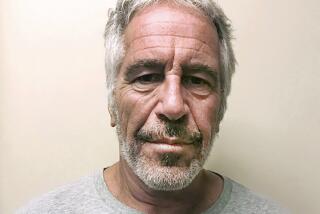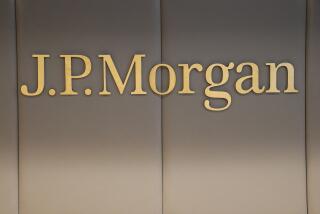Fidelity to pay its funds in gift probe
- Share via
NEW YORK — The stock traders played, and now Fidelity Investments will pay.
The mutual fund giant said Thursday that it would pay $42 million into its funds to cover potential losses by stock traders who steered Fidelity business to a brokerage that lavished them with extravagant gifts and entertainment.
The payment is the first of its kind by Boston-based Fidelity, the nation’s largest mutual fund company and provider of 401(k) retirement plans.
The payment comes amid a continuing Securities and Exchange Commission investigation into whether Fidelity traders paid higher prices for stock trades to the brokerage, Jefferies Group Inc., than were available from other firms.
A report released Thursday by the independent trustees for Fidelity funds said a statistical analysis showed that some trades were “misdirected.” But the report added that it was “not possible to prove” whether the funds paid inflated prices.
Nevertheless, the report said that the traders’ conduct was “worthy of redress” and that “any uncertainty should be resolved in favor of the funds.”
In response to the report, Fidelity said it would pay $42 million to the funds, plus interest. The company said that figure was based on the findings of the statistical analysis.
Fidelity spokeswoman Anne Crowley said the money would be deposited in Fidelity stock funds, with amounts to be determined later. Fund investors will see a nominal rise in the value of their holdings, although they will not receive any money directly.
Crowley said the misdirection of some stock trades did not necessarily mean that traders paid excessive prices or that investors suffered.
Early this month, Jefferies agreed to pay almost $10 million for its role in the gift scandal.
According to regulators, former Jefferies employee Kevin Quinn handed out more than $1.6 million in gifts, trips and entertainment to Fidelity traders from 2002 to 2004, far exceeding the $100 annual limit for each individual.
In one instance, Fidelity traders were flown on chartered aircraft to the 2004 Super Bowl in Houston, where the tab for the weekend -- including pregame parties hosted by Playboy and Maxim magazines -- came to $125,000.
One Fidelity trader and his family were treated to weeklong vacations in Florida for two years running. The Jefferies employee even shelled out $75,000 for a trader’s bachelor party in Miami.
The money lavished on traders appeared to have had an effect. The value of Fidelity’s trading business with Jefferies grew from $4 million in 2001 to $30 million in 2003, regulators said.
Jefferies, a New York-based investment bank that was once headquartered in Los Angeles, said it had made changes to prevent similar abuses.
Fidelity said previously that nearly two dozen traders had been disciplined in connection with the scandal and that eight had left the company.
In a letter to investors, Fidelity Chairman Edward C. Johnson III expressed his regret for the episode.
“I extend an apology for this improper behavior,” Johnson wrote. “Although there was an absence of proof of diminished execution quality, there is no question that the funds were put at potential risk.”
*
More to Read
Inside the business of entertainment
The Wide Shot brings you news, analysis and insights on everything from streaming wars to production — and what it all means for the future.
You may occasionally receive promotional content from the Los Angeles Times.










